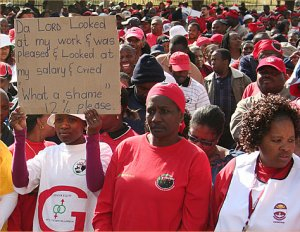Public Sector Strikes Sweep through South Africa

Editor's Note: On June 29, South Africa's striking public sector workers called off their four-week strike, announcing a tentative agreement with the government. Full details are not yet available.
One million workers across South Africa went on strike June 1, shutting down public services throughout the country. While their immediate demand was an across-the-board pay increase, the strike also reflected workers’ growing dissatisfaction with the government led by the African National Congress (ANC) and President Thabo Mbeki. The strike is the country’s largest since apartheid rule ended in 1994.
The strike led to what one source called “a total public service shutdown,” with hospitals and schools reportedly particularly hard hit. Courts and government offices were also affected.
Strikers and supporters marched on government buildings, picketed schools and hospitals, and rallied in all regions of the country. The 16 striking unions initially demanded 12 percent wage increases, though many of them reportedly reduced their demand to 10 percent a few days into the strike.
The government raised its initial offer of a 5.3 percent raise to 6.5 percent, and then to 7.25 percent, but with inflation in South Africa at seven percent, unions say a raise lower than 10 percent doesn’t represent significant improvement.
Strikers got a boost on June 13 when 600,000 private sector workers joined them on the picket lines for a one-day national general strike. Strikers and supporters rallied in some 43 cities across the country, holding demonstrations of up to 10,000 people.
Congress of South African Trade Unions (COSATU) spokesperson Patrick Craven called the strike a “fantastic manifestation of workers’ power and solidarity,” noting that many of the private sector supporters “sacrificed a day’s wages to demonstrate their support for their fellow workers.”
HARD LINE RESPONSE

SUPPORT LABOR NOTES
BECOME A MONTHLY DONOR
Give $10 a month or more and get our "Fight the Boss, Build the Union" T-shirt.
The government took a hard line with the strikers. During the strike’s first week, police reportedly used rubber bullets, stun grenades, and water cannons against demonstrators at various picket locations, injuring dozens of strikers.
While government officials asserted that the police and military were protecting non-striking workers who tried to get past the picket lines, COSATU condemned “employers’ intimidation and bullying antics.” Eight of the striking unions are COSATU affiliates.
Health care workers, and nurses in particular, were the focus of government ire. On June 10, after repeated threats, the government fired some 600 striking nurses, saying that their walkout was illegal. Under South Africa’s Labour Relations Act, workers providing “essential services,” such as nurses and police, can be barred from striking.
The law does, however, allow essential services workers to sign “minimum service agreements” that will allow these workers to strike as long as agreed minimum levels of service are maintained. According to Fikile Majola, general secretary of the National Education, Health and Allied Workers’ Union, the government has dragged its feet on signing minimum service agreements, thus severely restricting nurses’ right to strike.
Majola explained, “It has been several years now that we have been trying to negotiate a minimum service agreement. We have now come to the conclusion that the government doesn’t want to negotiate a minimum service agreement because it wants to undermine strike action.”
COSATU officials condemned the nurses’ firings, calling them “the sort of callous provocation one would expect from the worst maverick employers in the private sector—unforgivable from a democratically elected government put in power by the working class and the poor.”
POLITICAL TENSION
Since the fall of apartheid, COSATU and the ANC have been formal allies in South Africa’s governing coalition. Recent years, however, have seen growing tension between the country’s leading labor federation and ruling political party. The scale and intensity of the current strike suggest that these tensions have erupted into an all-out war between the government and its millions of employees.
Critics say that ANC rule has been characterized by growing inequality, massive unemployment (estimated as high as 40 percent), falling wages, and policies that favor business interests over workers and the poor. The ANC’s privatization of the country’s water and electric services, which cut off millions of South Africans’ access to both of these resources, was particularly controversial.





